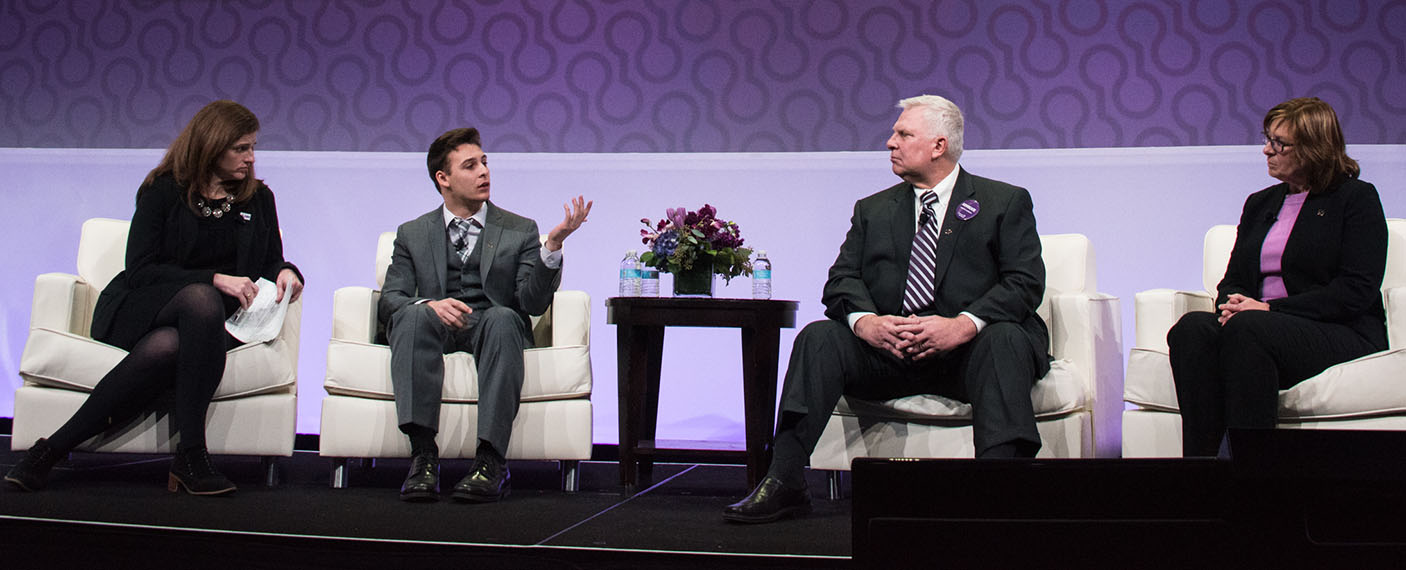Alzheimer's, advocacy bring family together
Rod Blough, 60, was diagnosed with both younger-onset Alzheimer's disease and Lewy body dementia in 2017, devastating news for the now-retired human resources executive and his family.
"I found out I was a double winner," Rod joked during the April 1 morning general session at the 2019 Alzheimer's Impact Movement Advocacy Forum.
Rod, his wife, Jennifer, and 21-year-old son Cole, the youngest of their two children, took the stage in front of over 1,200 advocates to share their story. Rod's light-hearted comment about his dual diagnosis is reflective of how the Dublin, Ohio, family chooses to face Rod's dementia. But the journey for the Blough family has not been easy.
Rod was involved in a serious bicycle crash in 2015, sustaining a concussion among other injuries. He had fallen twice, three months apart, prior to the accident, which resulted severe headaches, behavioral changes and short-term memory loss. This third incident led doctors to conduct tests that revealed Rod was living with dementia.
"Rod was, and is, a very talented man, a very intelligent man, somebody who relied on his own self-preservation skills," Jennifer said. "All of a sudden he found himself in a place where he didn't know who he was and how he fit in. I didn't know how to help him. We all struggled with what is our new identity — how do we make Rod feel self-worth? How do we all gather around him and stay positive?"
"To watch him lose that sense of identity was difficult to watch," said Cole, a student at Ohio State University. "We were worried about him because we didn't know what he would think of himself. You don't know what's going to happen. There's fear. It took a long time for everyone to get past that."
Not only did the family move on as best they could, they've grown closer, which they believe is due in part to becoming involved with the Alzheimer's Association and immersing themselves in learning about Alzheimer's and advocating for the cause.
"We communicate better today," Jennifer said. "We've spent a lot of time as a family talking about our experiences. We've come together. We're closer. We love one another, and we're in it for the fight."
Rod thanked the caregivers like Jennifer in attendance for doing all they're doing, even the simplest tasks.
"I can't even put my own socks on anymore," he said. "My wife has to put on my socks. I'm an independent-minded person, and that's an indication of the type of change that goes on with this disease. My appreciation goes out to all of you … My wife, son and daughter have supported me in a way that allows me to have a sense of dignity. Keep in mind how powerful it is that the things you say and do allow people like me to have dignity."
Rod, an Alzheimer's Association National Early-Stage Advisor, told a story about the power of advocacy. In a meeting with Rep. Steve Stivers (R-Ohio), someone he'd known for 20 years professionally, Rod plainly stated to Stivers that he needed to sponsor the BOLD Infrastructure for Alzheimer's Act, legislation signed into law in December 2018 that will create a nationwide infrastructure to implement effective Alzheimer's interventions.
"I looked him in the eye and told him this was the right thing to do," Rod said. "He's a fiscal conservative. He squeezes dimes so hard you can't get them out of his hand. I said, 'Steve, we're not asking you for a handout. We want you to make an investment.' Two days later, he signed on to support BOLD. That's the power you have when you talk to representatives."
Rod refuses to allow his dementia to define him or impact his happiness. He says he wakes up every day and finds the positive aspects of his situation, whether it's spending time with his family, playing golf — or splurging on large purchases.
"When I was diagnosed, the first thing I did was buy a two-seated convertible sports car in bright orange," he said. "People would say, 'You have Alzheimer's, you're not going to be able to drive it after a while.' I'd say, 'OK, I'm going to drive the hell out of it now.'"
Rod has a sunny attitude about life in general, and his bright outlook extends to the future of Alzheimer's research.
"There's a great deal of hope on the part of our family that we're going to find a cure," Rod said. "I'm absolutely convinced that during my lifetime we're going to find a cure. We're not that far away.
"I used to run marathons, and the last seven miles were always the hardest. I feel like we're at that seven-mile marker now, and all we have to do is push through."
Back to top
Back to Highlights

Join the conversation #ENDALZ #alzforum